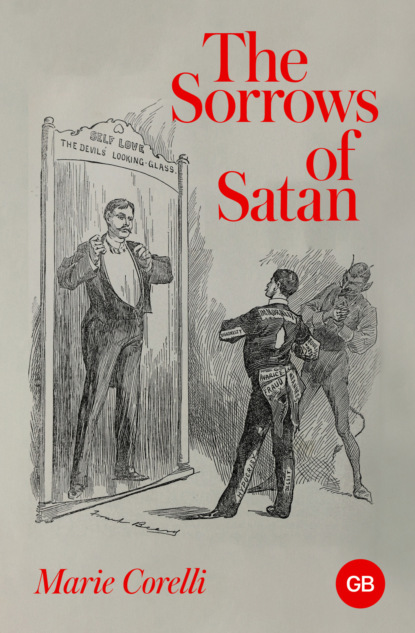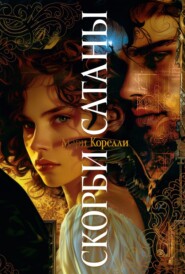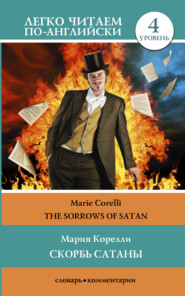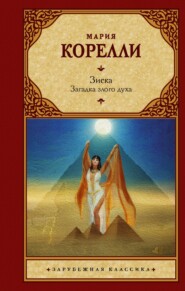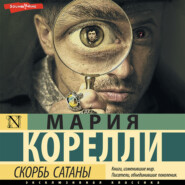По всем вопросам обращайтесь на: info@litportal.ru
(©) 2003-2025.
✖
The Sorrows of Satan
Настройки чтения
Размер шрифта
Высота строк
Поля
“It is a satisfaction and relief to ourselves,”—said Mr Bentham, “to have had it mentioned.”
I smiled, and thanking them, rose to go. They bowed to me once more, simultaneously, looking almost like twin brothers, so identically had their united practice of the law impressed itself upon their features.
“Good-day Mr Tempest,”—said Mr Bentham—“I need scarcely say that we shall serve you as we served our late client, to the best of our ability. And in matters where advice may be pleasant or profitable, we may possibly be of use to you. May we ask whether you require any cash advances immediately?”
“No, thank you,”—I answered, feeling grateful to my friend Rimânez for having placed me in a perfectly independent position to confront these solicitors—“I am amply provided.”
They seemed, I fancied, a trifle surprised at this, but were too discreet to offer any remark. They wrote down my address at the Grand Hotel, and sent their clerk to show me to the door. I gave this man half-a-sovereign to drink my health which he very cheerfully promised to do,—then I walked round by the Law Courts, trying to realize that I was not in a dizzy dream, but that I was actually and solidly, five times a millionaire. As luck would have it, in turning a corner I jostled up against a man coming the other way, the very publisher who had returned me my rejected manuscript the day before.
“Hullo!” he exclaimed stopping short.
“Hullo!” I rejoined.
“Where are you off to?” he went on—“Going to try and place that unlucky novel? My dear boy, believe me it will never do as it is…”
“It will do, it shall do;”—I said calmly—“I am going to publish it myself.”
He started. “Publish it yourself! Good heavens!—it will cost you—ah!—sixty or seventy, perhaps a hundred pounds.”
“I don’t care if it costs me a thousand!”
A red flush came into his face, and his eyes opened in astonishment.
“I thought … excuse me …” he stammered awkwardly; “I thought money was scarce with you–”
“It was,” I answered drily—“It isn’t now.”
Then, his utterly bewildered look, together with the whole topsy-turviness of things in my altered position, struck me so forcibly that I burst out laughing, wildly, and with a prolonged noise and violence that apparently alarmed him, for he began looking nervously about him in all directions as if meditating flight. I caught him by the arm.
“Look here man,” I said, trying to conquer my almost hysterical mirth—“I’m not mad—don’t you think it,—I’m only a—millionaire!” And I began laughing again; the situation seemed to me so sublimely ridiculous. But the worthy publisher did not see it at all—and his features expressed so much genuine alarm that I made a further effort to control myself and succeeded. “I assure you on my word of honour I’m not joking—it’s a fact. Last night I wanted a dinner, and you, like a good fellow, offered to give me one,—to-day I possess five millions of money! Don’t stare so! don’t have a fit of apoplexy! And as I have told you, I shall publish my book myself at my own expense, and it shall succeed! Oh I’m in earnest, grim earnest, grim as death!—I’ve more than enough in my pocketbook to pay for its publication now!”
I loosed my hold of him, and he fell back stupefied and confused.
“God bless my soul!” he muttered feebly—“It’s like a dream!—I was never more astonished in my life!”
“Nor I!” I said, another temptation to laughter threatening my composure,—“But strange things happen in life, as in fiction. And that book which the builders—I mean the readers—rejected, shall be the headstone of the corner—or—the success of the season! What will you take to bring it out?”
“Take? I? I bring it out!”
“Yes, you—why not? If I offer you a chance to turn an honest penny shall your paid pack of ‘readers’ prevent your accepting it? Fie! you are not a slave,—this is a free country. I know the kind of people who ‘read’ for you,—the gaunt unlovable spinster of fifty,—the dyspeptic book-worm who is a ‘literary failure’ and can find nothing else to do but scrawl growling comments on the manuscript of promising work,—why in heaven’s name should you rely on such incompetent opinion? I’ll pay you for the publication of my book at as stiff a price as you choose and something over for good-will. And I guarantee you another thing—it shall not only make my name as an author, but yours as a publisher. I’ll advertise royally, and I’ll work the press. Everything in this world can be done for money …”
“Stop, stop,”—he interrupted.—“This is so sudden! You must let me think of it—you must give me time to consider–”
“Take a day for your meditations then,” I said—“But no longer. For if you don’t say yes, I’ll get another man, and he’ll have the big pickings instead of you! Be wise in time, my friend!—good-day!”
He ran after me.
“Stay,—look here! You’re so strange, so wild—so erratic you know! Your head seems quite turned!”
“It is! The right way round this time!”
“Dear dear me,” and he smiled benevolently—“Why, you don’t give me a chance to congratulate you. I really do, you know—I congratulate you sincerely!” And he shook me by the hand quite fervently. “And as regards the book I believe there was really no fault found with it in the matter of literary style or quality,—it was simply too—too transcendental, and unlikely therefore to suit the public taste. The Domestic-Iniquity line is what we find pays best at present. But I will think about it—where will a letter find you?”
“Grand Hotel,” I responded, inwardly amused at his puzzled and anxious expression—I knew he was already mentally calculating how much he could make out of me in the pursuit of my literary whim—“Come there, and lunch or dine with me tomorrow if you like—only send me a word beforehand. Remember, I give you just a day’s grace to decide,—it must be yes or no, in twenty-four hours!”
And with this I left him, staring vaguely after me like a man who has seen some nameless wonder drop out of the sky at his feet. I went on, laughing to myself inaudibly, till I saw one or two passers-by looking at me so surprisedly that I came to the conclusion that I must put a disguise on my thoughts if I would not be taken for a madman. I walked briskly, and presently my excitement cooled down. I resumed the normal condition of the phlegmatic Englishman who considers it the height of bad form to display any personal emotion whatever, and I occupied the rest of the morning in purchasing some ready-made apparel which by unusual good luck happened to fit me, and also in giving an extensive, not to say extravagant order to a fashionable tailor in Sackville Street who promised me everything with punctuality and despatch. I next sent off the rent I owed to the landlady of my former lodgings, adding five pounds extra by way of recognition of the poor woman’s long patience in giving me credit, and general kindness towards me during my stay in her dismal house,—and this done I returned to the Grand in high spirits, looking and feeling very much the better for my ready-made outfit. A waiter met me in the corridor and with the most obsequious deference, informed me that ‘his excellency the prince’ was waiting luncheon for me in his own apartments. Thither I repaired at once, and found my new friend alone in his sumptuous drawing-room, standing near the full light of the largest window and holding in his hand an oblong crystal case through which he was looking with an almost affectionate solicitude.
“Ah, Geoffrey! Here you are!” he exclaimed—“I imagined you would get through your business by lunch time, so I waited.”
“Very good of you!” I said, pleased at the friendly familiarity he displayed in thus calling me by my Christian name—“What have you got there?”
“A pet of mine,”—he answered, smiling slightly—“Did you ever see anything like it before?”
VI
I approached and examined the box he held. It was perforated with finely drilled holes for the admission of air, and within it lay a brilliant winged insect coloured with all the tints and half-tints of the rainbow.
“Is it alive?” I asked.
“It is alive, and has a sufficient share of intelligence,”—replied Rimânez. “I feed it and it knows me,—that is the utmost you can say of the most civilized human beings; they know what feeds them. It is quite tame and friendly as you perceive,”—and opening the case he gently advanced his forefinger. The glittering beetle’s body palpitated with the hues of an opal; its radiant wings expanded, and it rose at once to its protector’s hand and clung there. He lifted it out and held it aloft, then shaking it to and fro lightly, he exclaimed—
“Off, Sprite! Fly, and return to me!”
The creature soared away through the room and round and round the ceiling, looking like a beautiful iridescent jewel, the whirr of its wings making a faint buzzing sound as it flew. I watched it fascinated, till after a few graceful movements hither and thither, it returned to its owner’s still outstretched hand, and again settled there making no further attempt to fly.
“There is a well-worn platitude which declares that ‘in the midst of life we are in death’”—said the prince then softly, bending his dark deep eyes on the insect’s quivering wings—“But as a matter of fact that maxim is wrong as so many trite human maxims are. It should be ‘in the midst of death we are in life.’ This creature is a rare and curious production of death, but not I believe the only one of its kind. Others have been found under precisely similar circumstances. I took possession of this one myself in rather a weird fashion,—will the story bore you?”
“On the contrary”—I rejoined eagerly, my eyes fixed on the radiant bat-shaped thing that glittered in the light as though its veins were phosphorescent.
He paused a moment, watching me.
“Well,—it happened simply thus,—I was present at the uncasing of an Egyptian female mummy;—her talismans described her as a princess of a famous royal house. Several curious jewels were tied round her neck, and on her chest was a piece of beaten gold quarter of an inch thick. Underneath this gold plate, her body was swathed round and round in an unusual number of scented wrappings; and when these were removed it was discovered that the mummified flesh between her breasts had decayed away, and in the hollow or nest thus formed by the process of decomposition, this insect I hold was found alive, as brilliant in colour as it is now!”
I could not repress a slight nervous shudder.
“Horrible!” I said—“I confess, if I were you, I should not care to make a pet of such an uncanny object. I should kill it, I think.”
He kept his bright intent gaze upon me.
“Why?” he asked. “I’m afraid, my dear Geoffrey, you are not disposed to study science. To kill the poor thing who managed to find life in the very bosom of death, is a cruel suggestion, is it not? To me, this unclassified insect is a valuable proof (if I needed one) of the indestructibility of the germs of conscious existence; it has eyes, and the senses of taste, smell, touch and hearing,—and it gained these together with its intelligence, out of the dead flesh of a woman who lived, and no doubt loved and sinned and suffered more than four thousand years ago!” He broke off,—then suddenly added—“All the same I frankly admit to you that I believe it to be an evil creature. I do indeed! But I like it none the less for that. In fact I have rather a fantastic notion about it myself. I am much inclined to accept the idea of the transmigration of souls, and so I please my humour sometimes by thinking that perhaps the princess of that Royal Egyptian house had a wicked, brilliant, vampire soul,—and that … here it is!”
A cold thrill ran through me from head to foot at these words, and as I looked at the speaker standing opposite me in the wintry light, dark and tall, with the ‘wicked, brilliant, vampire soul’ clinging to his hand, there seemed to me to be a sudden hideousness declared in his excessive personal beauty. I was conscious of a vague terror, but I attributed it to the gruesome nature of the story, and, determining to combat my sensations, I examined the weird insect more closely. As I did so, its bright beady eyes sparkled, I thought, vindictively, and I stepped back, vexed with myself at the foolish fear of the thing which overpowered me.
“It is certainly remarkable,”—I murmured—“No wonder you value it,—as a curiosity. Its eyes are quite distinct, almost intelligent in fact.”
“No doubt she had beautiful eyes,”—said Rimânez smiling.
“She? Whom do you mean?”





